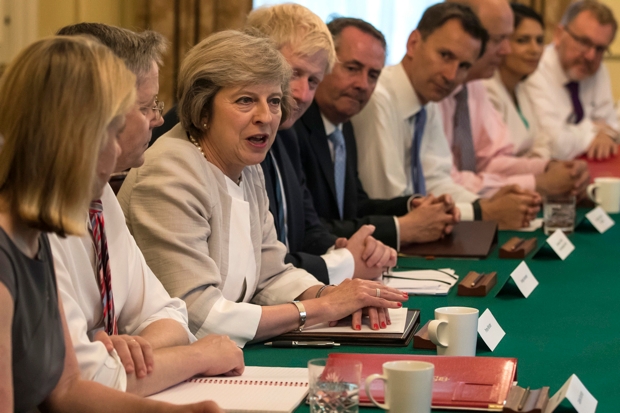Time was when Theresa May ran such a tight ship as Prime Minister that even so much as talking off the record to journalists was seen as a bit of a risk for a Cabinet minister to take. But post-election, the Prime Minister has so little authority that a number of things that previously seemed impossible are now quite safe.
The first is that it’s pretty much fine for a Cabinet minister to take a different stance to his or her colleagues. The main risk is not to the minister themselves but to the Prime Minister as her government appears to have five different stances on every important matter, with public sector pay being the most notable example. There are the flagrant examples, such as Andrea Leadsom turning up at the site of the Grenfell disaster without telling Number 10 that she would be paying a visit, and then there are the obvious splits that no-one is taking any care to hide any more, such as that between Downing Street and the Treasury. The differences of opinion in Cabinet on Brexit are another reason why organisations such as the CBI are pushing for the UK to stay in the single market and the customs union until there is a final Brexit deal: the government may not be able to fight off these proposals with the sort of unified response a strong Prime Minister could normally reasonably expect of her juniors.
The second is that it’s also pretty fine for Tory MPs to criticise certain policies, including that public sector pay cap, or to argue for the end to certain cuts about which previously they would have had to keep silent. This isn’t just because most MPs feel that the May era will be over sufficiently soon for them to cause trouble without risking their future career as a minister, it’s also because one of the lessons from the election result is that voters are ‘weary’ of austerity. Whether or not this lesson is actually true doesn’t matter: it has become part of the political narrative, and it is useful for many MPs who want certain policies dropped to agree that voter weariness with austerity is one of the most important lessons of the election. Tory MPs are pushing again for a better deal for those women affected by the changes to the state pension age, knowing that they could easily humiliate the government by defeating it in a Commons vote.
The third previously dangerous act is thinking out loud about the future of the Conservative party. There are so many informal groups gathering to discuss policies (and to plot when that future might begin, with reports today suggesting that an attempt to remove May could come as soon as conference season) that the party seems to have turned into a coffee house, where ideas and debate take place in the open. Previously, it would have been considered disrespectful to the Prime Minister to suggest that the Conservative party needs to do more of this or that, but now, no-one fears that talking about a new direction for the party will damage their chances of a fulfilling career in Westminster, as the Prime Minister has no authority.
This is fun for MPs and certainly for those watching Westminster. But it makes it impossible for the government to take any vaguely controversial positions. Proper politics involves taking controversial decisions and getting on with implementing them. Until there is a Prime Minister who commands authority over the Conservative party, there won’t be much proper politics taking place in Parliament.







Comments